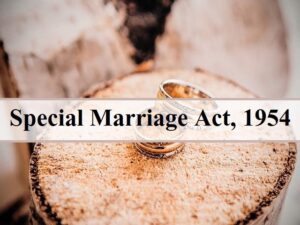India is a country with a secular culture where several religions or people from different ethnicities reside together. Given the rich diversity in religion and culture, various laws and acts have been passed to regulate the different aspects of Marriage. The Special Marriage Act, introduced in 1954, allows people of different religions, Caste, or nationalities to marry without Conversion and adhere to their religion and beliefs. Gupta Documents Centre breaks down the Procedure for the Solemnization of Marriage Under The Special Marriage Act, 1954, to give readers a better understanding of this topic.
 What is The Special Marriage Act, 1954
What is The Special Marriage Act, 1954
It lays down legal provisions for civil marriages, allowing individuals to marry beyond religious, caste, or faith-based boundaries. It enables interfaith and inter-caste marriages, without being in need of renouncing their religion. This Act is considered a significant step toward promoting secularism, as it provides a special form of marriage where the parties are not associated with any Personal Marriage Act. It applies to the entire country and people of any religion.
Key Features of The Special Marriage Act, 1954
- It applies to all citizens of the country, including Hindus, Muslims, Christians, Sikhs, and Buddhists. People belonging to any ethnicity, race, culture, or creed display their Secular nature. Some main features have been displayed below:
- The parties should not fall within the “degrees of prohibited relationship”; you can’t marry someone who is related to you in a way that the law considers too close for a marriage unless permitted by custom.
- No religious ceremonies are required; marriage is a civil contract solemnized through registration, unlike other Personal Marriage Acts. It provides both Solemnization and legal recognition of the marriage.
- It covers marriages between Indian citizens as well as Indians residing in Foreign.
- For marriages solemnized in Jammu and Kashmir, both parties must be Indian citizens domiciled in territories where the Act applies.
Solemnization Of Marriages Under The Special Marriages Act,1954
The solemnization of marriage refers to the formal ceremony or act of getting married, conducted according to legal norms. It’s the official process by which a marriage is recognized by law or the Judicial system. It is officiated by a person authorized by law (Marriage Officer).
Conditions required to solemnize the special marriages.
- Neither party should have a living spouse (monogamy is mandatory) and Polygamy is forbidden.
- The groom has completed the age of 21, and the bride should be at least 18 years old.
- Both parties should be capable of giving valid consent and must be of sound mind.
- Neither party is within the degrees of prohibited relationship.
- Neither party has been subject to recurrent attacks of insanity.
Notice Of Intended Marriage:
The couple must give a 30-day notice in writing to the Marriage Officer of the district where at least one party has resided for 30 days before the notice.
Publication of Notice
The Marriage Officer will publish the notice in Public, and they are allowed to object to it under certain legal grounds ( If one party is already married, suffering from some mental disorder, etc)
Objection to marriage.
Any person can object to the marriage before the expiration of 30 days after the notice has been released by the Marriage Officer in Public. If no valid objection is raised the marriage proceeds further.
Power Of Marriage Officer
(a) Requiring witnesses and both parties to be present.
(b) discovery and inspection
(c) compelling the production of documents
(d) reception of evidence of affidavits
Declaration by Witnesses
Before the solemnization of marriage, both parties, along with the 03 witnesses, should be present in the presence of the Marriage officer and must sign a declaration form which is further countersigned by the Marriage Officer.
Place of Solemnization of Marriage
Marriage should be solemnized at the Office of Marriage Officer in whatever form decided by both the parties and in any language understood by the parties,―“I, (A), take the (B), to be my lawful wife (or husband)”.
Certification
When the Marriage has been solemnized by the Marriage Officer, a Certificate is issued and it must be signed by both parties and 03 witnesses, and the Marriage is declared to be solemnized legally following all the legal and necessary steps.
The Certificate is evidence of the fact that a marriage has been solemnized under The Special Marriage Act, of 1954.
Notice When Marriage is not Solemnized within 03 month period
A new Notice is issued when the Marriage is not solemnized within 03 months from the date on which notice has been given to the Marriage Officer, and the further Solemnization of the marriage will not take place until a new notice has been given in this manner.
Documents Required :
- Proof of age
- Proof of address
- Passport-sized photographs of both parties
- Proof of marital status ( affidavit declaring no existing spouse).
- For foreigners: Passport, visa, and no-objection certificate from their embassy, if required.
Conclusion
It’s a progressive piece of Legislation that stands with the value of secularism, equality, and personal freedom, allowing people to marry without any religious and cultural boundaries, along with ensuring legal recognition and protection for interfaith-inter caste couples.
